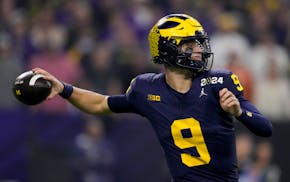JACKSONVILLE, FLA. - By the time Jacksonville's fumbling and bumbling had handed the Vikings a 30-12 victory, Brad Childress' decision to bench Adrian Peterson for two offensive series on Sunday seemed inconsequential, even irrelevant.
Peterson's backup, Chester Taylor, performed well, and Peterson still took most of the handoffs and led the team in rushing, and the Vikings remained in a tie for first place, so what's the big deal?
Despite the victory and the manner in which it was achieved, these kinds of decisions carry risk. When an embattled coach benches his star player, the coach opens the door to a number of consequences.
We've seen star NBA players engineer the firing of their coaches. We've seen coaches in all sports lose their jobs after losing the support of their key players. We've seen star players demand trades after chafing under a disciplinarian. We've seen angry athletes become the stars of 24-hour news cycles.
In this case, Peterson showed up late for a team meeting on Saturday. Childress decided to punish him by holding Peterson out of the Vikings' first two offensive series.
By the time Peterson touched the ball, the Vikings led 14-0. What if the reverse had occurred? What if the Vikings had fallen behind 14-0 while Peterson stewed on the sideline, and Childress' decision cost his team a game, maybe even a shot at the playoffs, maybe even his job?
Childress' decision casts him as either despotic or brave. I favor the latter.
In the NFL, nothing destroys a team faster than a weak-hearted head coach. Stars may rule the NBA, but in the NFL, over the long term, in a complex and brutal game, coaches can't cater to individuals.
That's why Bill Parcells won everywhere he coached, whether his quarterback was a standout named Phil Simms, a statue named Drew Bledsoe, a backup named Jeff Hostetler or an octagenarian named Vinny Testaverde.
Childress is also following the lead of the coaches of the two best teams in football this year.
It was no more than a calendar year ago when the Giants' Tom Coughlin was considered too stern to win big with a mouthy team in New York/New Jersey. That was before he led the Giants to four postseason victories on the road, culminating with a victory over the undefeated Patriots in the Super Bowl. He's continued to discipline temperamental receiver Plaxico Burress every few weeks, and his team keeps on winning.
At the beginning of the season, Tennessee's Jeff Fisher had to deal with a coach's nightmare -- his franchise quarterback playing poorly, declining to play, getting hurt, then prompting rumors that he was suicidal. Fisher benched him, installed Kerry Collins, told Vince Young he'd have to earn his job back, and now Tennessee looks like a model franchise even without a franchise quarterback.
In the NBA, benching a star player can get you fired. In the NFL, discipline reaps rewards.
Childress benched cornerback Cedric Griffin for one series, and Peterson for two, for showing up late for a team meeting. "I talked to our leadership committee, they were all unanimous with that," Childress said. "That's just how it goes. Everybody else is accountable; they're accountable as well."
I asked Childress if it's difficult to bench his best player. "Not at all," he said, "when everybody understands what the ground rules are. We don't have a lot of rules. You set your fenceposts deep, and there are rules that are not negotiable, it doesn't matter who it is. It's affected different people, good players, at different times. I don't care if it's a guy who is a practice squad guy or a guy who is, as you say, the best player on the team."
If you injected them with truth serum, the Wilfs would admit they'd send Childress to Siberia before they'd part with Peterson. Childress knows that, which is why it took guts for him to bench his star.
Jim Souhan can be heard Sundays from 10 a.m.-noon on AM-1500 KSTP. jsouhan@startribune.com

Souhan: Wolves fans made Game 1 special. Now bring on Game 2.

Souhan: Should Vikings even consider McCarthy in NFL draft?

Souhan: NAW erases Suns' lead, Game 1 advantage with big performance

Souhan: This is KAT's chance to prove Flip Saunders was right


